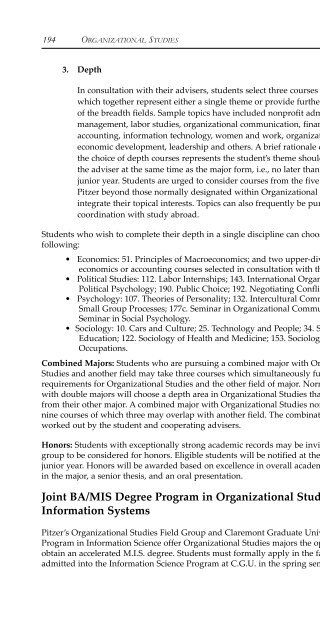You also want an ePaper? Increase the reach of your titles
YUMPU automatically turns print PDFs into web optimized ePapers that Google loves.
194 ORGANIZATIONAL STUDIES<br />
3. Depth<br />
In consultation with their advisers, students select three courses for depth<br />
which together represent either a single theme or provide further work in one<br />
of the breadth fields. Sample topics have included nonprofit administration, arts<br />
management, labor studies, organizational communication, finance and<br />
accounting, information technology, women and work, organizations and<br />
economic development, leadership and others. A brief rationale describing how<br />
the choice of depth courses represents the student’s theme should be filed with<br />
the adviser at the same time as the major form, i.e., no later than the fall of the<br />
junior year. Students are urged to consider courses from the five colleges and at<br />
<strong>Pitzer</strong> beyond those normally designated within Organizational Studies which<br />
integrate their topical interests. Topics can also frequently be pursued in<br />
coordination with study abroad.<br />
Students who wish to complete their depth in a single discipline can choose from the<br />
following:<br />
• Economics: 51. Principles of Macroeconomics; and two upper-division<br />
economics or accounting courses selected in consultation with the adviser.<br />
• Political Studies: 112. Labor Internships; 143. International Organizations; 185.<br />
Political Psychology; 190. Public Choice; 192. Negotiating Conflict.<br />
• Psychology: 107. Theories of Personality; 132. Intercultural Communication; 145.<br />
Small Group Processes; 177c. Seminar in Organizational Communication; 194.<br />
Seminar in Social Psychology.<br />
• Sociology: 10. Cars and Culture; 25. Technology and People; 34. Sociology of<br />
Education; 122. Sociology of Health and Medicine; 153. Sociology of Work and<br />
Occupations.<br />
Combined Majors: Students who are pursuing a combined major with Organizational<br />
Studies and another field may take three courses which simultaneously fulfill the<br />
requirements for Organizational Studies and the other field of major. Normally, students<br />
with double majors will choose a depth area in Organizational Studies that is different<br />
from their other major. A combined major with Organizational Studies normally includes<br />
nine courses of which three may overlap with another field. The combination is to be<br />
worked out by the student and cooperating advisers.<br />
Honors: Students with exceptionally strong academic records may be invited by the field<br />
group to be considered for honors. Eligible students will be notified at the end of their<br />
junior year. Honors will be awarded based on excellence in overall academic work, work<br />
in the major, a senior thesis, and an oral presentation.<br />
Joint BA/MIS Degree Program in Organizational Studies and<br />
Information Systems<br />
<strong>Pitzer</strong>’s Organizational Studies Field Group and Claremont Graduate University’s<br />
Program in Information Science offer Organizational Studies majors the opportunity to<br />
obtain an accelerated M.I.S. degree. Students must formally apply in the fall and be<br />
admitted into the Information Science Program at C.G.U. in the spring semester of their<br />
ORGANIZATIONAL STUDIES<br />
junior year. Applicants must demonstrate competence in information technology and be<br />
recommended by the <strong>Pitzer</strong> Organizational Studies Field Group. Students in the joint<br />
program must declare their major in Organizational Studies before applying for this<br />
program. Interested students should see J. Lewis.<br />
The joint program is a 19-course program that requires nine courses from the<br />
Organizational Studies major and 10 from the Information Science Program. This joint<br />
degree is designed to be completed in at least one year beyond the BA degree. The<br />
student must enroll at the Claremont Graduate University for at least 8 classes.<br />
Applicants to this program must also demonstrate competence in one or more computer<br />
languages before entering the program. Specific requirements for this program can be<br />
obtained from J. Lewis.<br />
Course Descriptions:<br />
Soc 13. Economy and Society. (See Sociology 13.) R. Volti. [not offered <strong>2007</strong>-<strong>08</strong>]<br />
Post 20. Congress and the Presidency. (See Political Studies 20.) Spring, D. Ward.<br />
Soc 25. Technology and People. (See Sociology 25.) Spring, R. Volti.<br />
Post 30. Comparative Politics. (See Political Studies 30.) Fall, N. Boyle.<br />
Soc 34. Sociology of Education. (See Sociology 34.) K. Yep. [not offered <strong>2007</strong>-<strong>08</strong>]<br />
Econ 51. Principles of Macroeconomics. (See Economics 51.) Fall, L. Yamane/E. Stephens;<br />
Spring, E. Stephens.<br />
Econ 52. Principles of Microeconomics. (See Economics 52.) Fall, M. Federman/Spring,<br />
J. Lehman.<br />
195<br />
Econ/Psyc 91. Statistics. (See Economics or Psychology 91.) Fall, L. Light (Psyc); Spring,<br />
L. Light. (Psyc)/L. Yamane (Econ).<br />
100. Organizational Theory. Examines the major ideas that shape the way we think about<br />
how people and institutions organize groups and work settings. Theorists include a long<br />
list from F. W. Taylor and Max Weber, to systems theorists, and post-modern and feminist<br />
theorists. Prerequisite: one social science course or consent of instructor. Fall, K. Rogers.<br />
Psyc 103. Social Psychology. (See Psychology 103.) Spring, J. Lewis.<br />
Psyc 104. Experimental Social Psychology. (See Psychology 104.) Fall, H. Fairchild.<br />
105. Cases in Management. This course is a case method approach that focuses on<br />
identifying and analyzing problems in organizational behavior, structure, design, and<br />
change. Each week a case will be assigned and discussed in class along with related<br />
reference materials which pertain to the special problems of that case. Prerequisite:<br />
Organizational Studies 100, or equivalent. Spring, K. Rogers.<br />
Psyc 107. Theories of Personality. (See Psychology 107.) Fall, F. Vajk.






![Anticipated Courses SP14 [pdf] - Pomona College](https://img.yumpu.com/25363335/1/190x245/anticipated-courses-sp14-pdf-pomona-college.jpg?quality=85)










